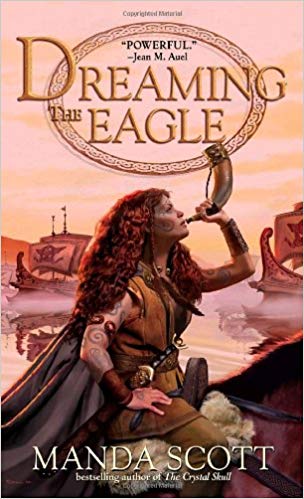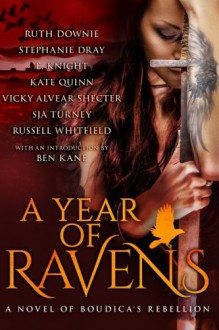
(This review also contains an overview of the entire quadrilogy.)
As a fan of historical fiction I have no problems with creative license and exploring ideas, especially when there is a shortage of reference material on a topic- in this case regarding the woman known as Boudica, who led a rebel campaign against the Roman legions in Brittania in the 1st century AD. Though we know the eventual outcome, as the saying goes: it's the journey that matters, not the destination.
This journey feels like a family vacation you're forced to go on with your new step-parent/siblings, so you brought your stash...
There's not a lot of factual info on Boudica herself so author Manda Scott flexes her worldbuilding muscles admirably and fashions a layered Celtic society that starts out exploring themes but quickly turns into pure propaganda. Which is a shame, `cause it coulda been a contender.
It's easy to see why Manda Scott is considered one of the better crime drama authors in the UK: multiple story threads weave together creating at times a compelling drama but at others can be obtuse, but not overly so.
Real characters and events get submerged beneath the author's iron-willed agenda. There's a clear metaphor of Rome as the Great Western Male-Dominated Ordered Society trying to bring the Celts as the Groovy Bisexual Spiritually-Free Goddess-Loving Individuals to heel. Given that the author is openly lesbian and an advocate of Dream Interpretation, you understand why you're being hit over the head.
Instead of Druids and Bards we're treated to Dreamers and Singers- and Dreamers never seem to be wrong... about anything. Along with this comes page after page of spiritual mumbo jumbo centered on animal symbolism, mystic interpretations, moonlight reflections on water, hair in every imaginable hue of yellow- pass the bong, please.
The main problem I had with the Dreamers is the lack of explanation for their skills. Yeah- there's some divine power at work here, but for three plus books they're infallible, and only at the end when you know things go wrong do their interpretations suddenly become ambiguous- it's like being at the George Lucas School of Revisionism.
**SPOILER ALERTS**
There's also the subject of sexuality. Lots of evidence has surfaced regarding Celts and their casual attitudes towards homosexuality, and while I expected it as a sub-theme and incidental to the story it almost overshadows it. Boudica herself is bisexual: her first love is her best friend Airmid, whom she's already having sex with when they're both in their early teens. After endless passages about their longing gazes and vows of eternal devotion there's a teenage breakup spat after which she starts to notice boys, especially Caradoc, son of Cunobelin, the most powerful king. Skip to young adulthood and we suddenly meet Ardacos, who becomes a prominent supporting character and happens to be her first male lover, except that she's already kicked him to the curb... No need to bother with all that messy `coming of age character development' crap while your girlfriend is still hanging around!
Marriages are deliberately replaced with sexually open relationships regardless of how many children a couple has- it's entirely up to the woman as to what happens. If it weren't for the historical fact that Boudica did have children, I seriously doubt she would have been given any male lovers in this story. The fate of the children's father shows this- the aforementioned Caradoc- another historical figure whose true final fate is uncertain. His removal from the story, while factually based up to a point, honestly felt like the author didn't know what else to do with him, but needed him to leave. You can hardly run back to the arms of your one true gay love with the father of your children hanging around, now can you?
'Tagos, a member of the Eceni (read: Iceni) tribe who grows up with Boudica, turns coward in battle and eventually loses his sword arm and the respect of his peers. His emasculation is forgettable until you realize that he's actually Prasutagos, who is historically known to be the Roman client king of their tribe and whom Boudica is known to be married to (here they only shack up for political purposes) and whose death triggers events that lead to the final assaults against the legions. This ham-handed hack job and attempt to shade his identity from readers is a clear author manipulation to facilitate Boudica's rise to power later in the story: no more weak male rulers, here's a real woman to lead us!
Then there's Cartimandua, a queen who likes to play both sides and another pivotal historical figure who's mentioned and never seen. Needing her support the rebels send emissaries, firstly Caradoc, whom she holds captive for the winter. Caradoc never elaborates about his captivity, though there's lots of innuendo. Venutios tries to use his influence to sway her and marries her to cement ties to the rebels, though she still does as she pleases. Given the significance of these events, it would've helped to see them unfold instead of being referred to in passing... but that would've been heterosexual.
I read through the entire series and can't recall one single healthy, nurturing straight relationship that survived the story- if someone doesn't die, it just plain ends badly. Whereas every gay/lesbian pairing is of soul-friends and soul-mates and... well, you get the idea. Case in point: Dubornos, an old friend and rival, likes Airmid, Boudica's lifelong lover. After that disaster there's Cygfa- Caradoc's daughter from another woman- who wants him, yet he doesn't reciprocate. When Dubornos finally develops deep, abiding, lifelong feelings for her, she's long over him and well into... wait for it... a lesbian relationship! You can't make this stuff up... but Manda Scott did!
The characterization of children of this story had them so far beyond precocious, I had to laugh. Repeatedly. As another reviewer pointed out- are these kids five or forty-five? A pre-teen boy defeats a grown man at a chess-like game like he's a master strategist instead of playing against one. Boudica herself displaces Venutios, a man over twice her age, as the pre-eminent warrior of the times... because she had a good day of hunting. Boudica's young daughter at the tender age of eight is so wise and prescient that the legendary warrior princess actually defers to her judgment on multiple occasions! Trees died for this shit!
The final battle was very poorly handled: in the book the Celts outnumber the Romans by about five to one, and have them hemmed in a valley... and they still lose?!? Even though the Romans had to win, this fight simply made no sense!
Lastly, there's the death scene that wasn't. Boudica's final fate is open to conjecture- Roman historians claim she poisoned herself to avoid capture (the author argues that this could be a conceit, as that's what a proper Roman woman would do). Here we get another all-too confusing battle scene to save her daughter's life resulting in a fatal, self-inflicted injury(!). After all, no true heroine could ever be beaten in honorable combat by the male enemy, oh no- far better that they die stupidly! We're not even given the payoff of a final scene: after a hell-ride to reach a final resting place for her all we get is another vision where Boudica bequeaths her legacy to her young daughter before crossing over. Pfft!
I know it doesn't seem like it, but there's a lot to recommend here. There's a wealth of detail, flavor and feeling to the story and I always enjoy a different take on a subject. And there's times when the imagery is amazing: in the final book there's a symbolic moment involving a hare that was simply a stroke of genius! I just wished there were more moments like that- less propaganda and proselytizing, and more prose.
2.5/5 Stars






 4,5 stars
4,5 stars